|
July 27, 2017
Federal Government Marches Further
into Dead End of Nation-Wrecking
Billions in State Funds for
Transportation Corridors to Serve U.S.-Dominated
Empire-Building
PDF
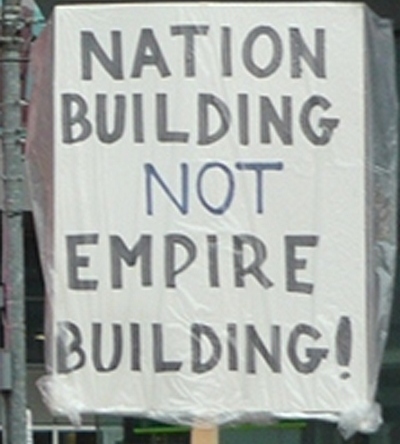 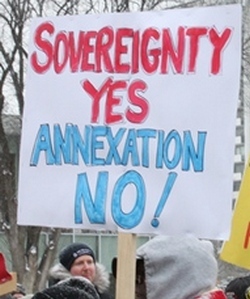 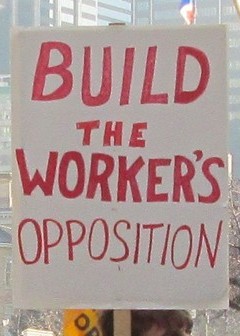
Federal
Government
Marches
Further into Dead End of Nation-Wrecking
• Billions in State Funds for Transportation
Corridors to Serve U.S.-Dominated Empire-Building
• Sale of Canadian Airports -- Privatizing
Everything and Selling the Country to the Global Oligarchs Exacerbates
the Crisis
Growing Opposition to
Privatization of Public Assets
• Ontario Public Sector Workers Denounce Hydro
One's Empire-Building
Purchase of a U.S. Utility
• Health Canada Gives Go-Ahead to Private
Pay-for-Plasma Clinic in New Brunswick
• Note to Readers
Federal Government Marches Further into
Dead End of Nation-Wrecking
Billions in State Funds for Transportation Corridors to
Serve U.S.-Dominated Empire-Building
The working class is determined to
affirm its right to build the new!
Transport Canada has announced another $2.1
billion of state funds for the Trade and Transportation Corridors
Initiative to serve the global oligopolies and their control of the
Canadian and international economy.[1]
 A Ministry press release on
July 4 states the
Trade and Transportation Corridors Initiative is "[to] build stronger,
more efficient transportation corridors to international markets....
Canadian businesses will be able to better compete, grow and create
even more jobs well into the future." A Ministry press release on
July 4 states the
Trade and Transportation Corridors Initiative is "[to] build stronger,
more efficient transportation corridors to international markets....
Canadian businesses will be able to better compete, grow and create
even more jobs well into the future."
The aim of the financial oligarchy is not to "create
jobs" or support "Canadian businesses." The aim is to maximize their
returns on investments and defend and expand their empires through
crushing their competitors and exploiting the resources and work-time
of Canadians. Using state funds, infrastructure and police power to
serve their
narrow private aim and objectives has become standard practice within
the imperialist system of states.
Transport Canada says the program is meant "to support
Canadian business and spur job creation.... Canada is marking a long
history of trade and recognizing the major role that transportation has
played in growing our economy and supporting Canada's middle-class."
The early building of the east/west railway, ports in
the Maritimes and later in BC, along with a Canadian steamship line,
state-owned Air Canada serving most Canadian cities, and highways and
bridges connecting far-flung population centres and resource producing
regions were features of a nation-building project in part to block the
expansionist continentalism of U.S. imperialism. That nineteenth and
twentieth century nation-building is dead and replaced with U.S.-led
global empire building with Canada integrated into a U.S.-dominated
Fortress North America. The global oligopolies have seized control of
Canada's human and material resources, especially in the basic sectors
of raw material extraction, energy, manufacturing, finance, retail
services, culture and the military. The Canadian economy has been
subsumed into U.S.-dominated private global empires and the free trade
agreements, military alliances and other international arrangements of
the U.S. imperialists as they strive for world hegemony.
Trudeau and other governments since Mulroney have
embroiled Canada into a worldwide array of military and economic
arrangements including trade and transport corridors serving the global
private oligopolies operating within the U.S.-dominated imperialist
system of states. This retrogressive direction has absolutely nothing
to do with
nation-building to guarantee the well-being of the people or affirm
their right to decide their future, control their economy, and solve
its problems for the benefit of all.
The Transport Canada announcement ignores the economic
context in which these state funds are being disbursed. According to
its press release, the main problem facing the Canadian economy appears
to be congestion in the transportation of goods from Canada to world
markets, including the dominant U.S. market, and vice versa. If the
transportation corridors are improved, Transport Canada implies the
problems of the economy will vanish.
 The implication is not borne
out with facts. The
announcement was made at about the same time Employment and Social
Development Canada revealed an increasing number of EI claimants are
receiving five additional weeks of benefits in 15 regions of the
country where unemployment has exploded over the last two years. The
program to extend EI eligibility, while still far below the actual
needs, temporarily untied the EI purse strings propelled by a rise in
unemployment in several regions. The expected number of 235,000
unemployed receiving the five weeks of additional EI benefits turned
out to be 317,261 unemployed workers. The implication is not borne
out with facts. The
announcement was made at about the same time Employment and Social
Development Canada revealed an increasing number of EI claimants are
receiving five additional weeks of benefits in 15 regions of the
country where unemployment has exploded over the last two years. The
program to extend EI eligibility, while still far below the actual
needs, temporarily untied the EI purse strings propelled by a rise in
unemployment in several regions. The expected number of 235,000
unemployed receiving the five weeks of additional EI benefits turned
out to be 317,261 unemployed workers.
Much of the increased unemployment and extended
benefits are in resource extraction regions badly hit with the decline
in both demand and global market prices for Canada's natural resource
commodities. Alberta, Saskatchewan and Newfoundland and Labrador
heavily depend on exports and the employment and value workers create
in
harvesting natural resources. The problem for Alberta and most regions
in Canada is internal, in the sense that exports overshadow the
domestic economy, its self-reliance, vitality and ability to stand on
its own. Control over the economy and those features that affect
people's lives directly is impossible in a situation where the
necessity to export is
dominant and control over prices and external demand is not possible.
Congestion within the freight transport corridors is
not the problem. The internal domestic economy is the problem because
it is out of the control of Canadians, in particular the actual
producers. Canadians are not able to manage the modern socialized
productive forces because they have no control. The productive capacity
of the modern
economy of industrial mass production is enormous but it has to be
brought under the control and scientific management of the actual
producers with an aim to serve them, the common good and general
interests of society.
 Canadians do not even
determine something as basic as
the market price of what they produce so that it meets the price of
production. Canadians have no control over how much they manufacture of
this or that commodity, even basic essential ones such as steel, so
that
internal production conforms to the apparent internal demand allowing
some stability and security in the sector. Canadians do not control
their banking system and are even losing control of public services and
social programs as they are sold off to global investors eager to
exploit every aspect of the economy and have already-produced value
pour into their private coffers. Canadians do not even
determine something as basic as
the market price of what they produce so that it meets the price of
production. Canadians have no control over how much they manufacture of
this or that commodity, even basic essential ones such as steel, so
that
internal production conforms to the apparent internal demand allowing
some stability and security in the sector. Canadians do not control
their banking system and are even losing control of public services and
social programs as they are sold off to global investors eager to
exploit every aspect of the economy and have already-produced value
pour into their private coffers.
Canadians literally are at the mercy of the
international financial oligarchy and its private empires. They control
the basic sectors. Their empires serve their narrow private aim and
needs to expand their wealth and defend their class privilege denying
Canadians what is theirs by right. The oligarchs compete to defend and
expand their private
empires in a system that can only be described as anarchy leading to
crises, violence and war. The problem worsens with the increasing
concentration of the social wealth that workers produce in the hands of
global oligopolies and multi-billionaires who use it and state power to
serve their narrow private interests.
The media report that Transport Minister Marc Garneau
at
the luncheon speech, where he made the announcement of the allocation
of state funds, slavishly said the Canadian government is willing to
pay the entire bill with respect to the U.S. border corridors, just as
Canada is now paying the bill for the new Gordie Howe International
Bridge linking Detroit and Windsor.
Dedicated to the class privilege of the oligarchs and
their aim for ever greater power and social wealth, government
representatives seem incapable of presenting the reality as it exists.
Their imperialist outlook and thinking does nt conceive of a society
which take up social responsibility or changes the direction of the
economy.
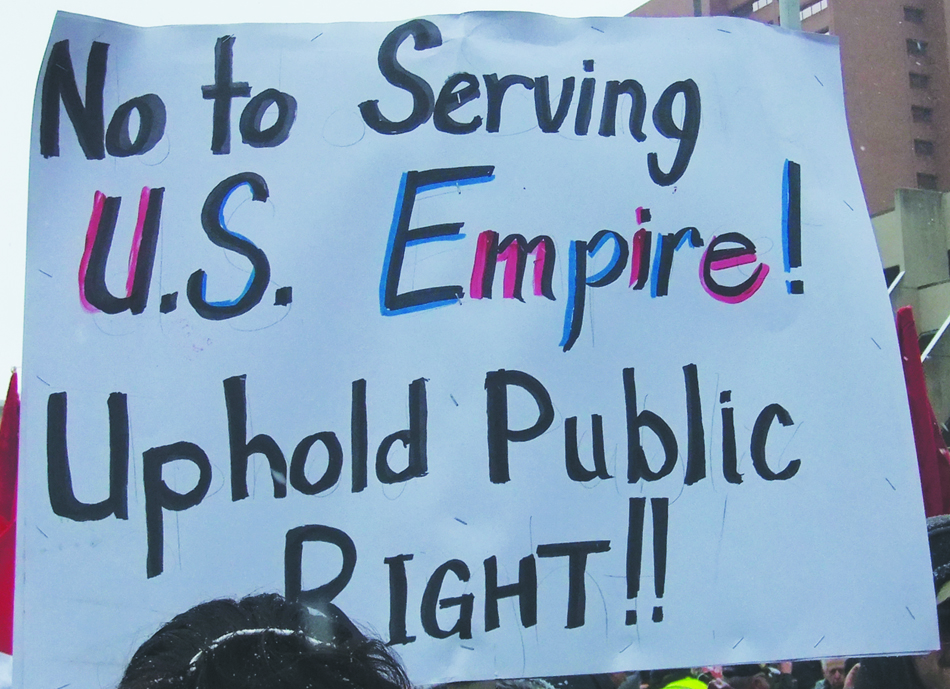 Minister Garneau does not
consider it a problem that
Canada, as a dominated trading nation: Minister Garneau does not
consider it a problem that
Canada, as a dominated trading nation:
- does not own or control its basic economic sectors or
have any sovereign say in economic development;
- does not determine and control the market prices of its produced
natural resources or any of its main commodities for that matter;
- does not have any arrangement for exports or imports with sovereign
nations that meets a modern
criteria of justice, stability, mutual benefit and development, and
sovereign control outside of and in opposition to the control of
private global empires;
- is entangled in global arrangements such as the World Trade
Organization and free trade agreements that put economic decisions in
the hands of those who own and control vast social wealth and
have the single-minded aim to increase their wealth, power and class
privilege through exploiting the resources and working class of Canada
and other countries;
- attracts those global individuals and entities to make money by
putting at their disposal Canada's resources and educated, trained and
healthy working class and by providing
infrastructure including transportation corridors and police state
measures to restrict workers from affirming their rights;
- is at the mercy of the world market dominated by the oligopolies and
is not able to protect itself against the inevitable cyclical economic
crises within the imperialist system of states dominated by the U.S.
empire, be it a
generalized economic crises such as in 2008, or the current
sectoral crisis of market prices of energy and other resources, which
have fallen below their prices of production.
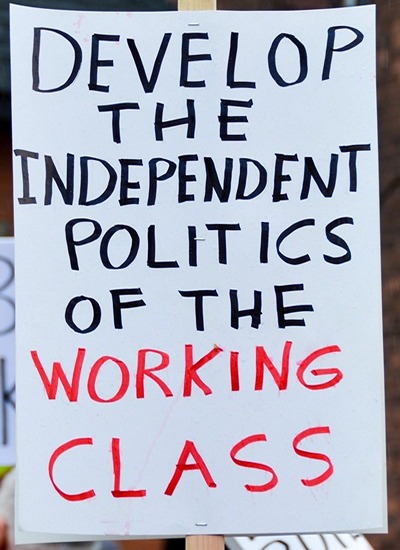 Across the country, workers
are opposing the denial of reality and pragmatic ambitions of the
Canadian government to serve the strivings of the global oligopolies at
all costs to the detriment of the well-being and security of Canadians
and their economy. The need is becoming more and more obvious for the
working class to assume its social responsibility to change the
direction of the economy to make it work without crises for the benefit
of all. In this regard, advanced workers are building the independent
press of the working class such as Workers'
Forum and taking up embarking on campaigns such as those led by
Marxist-Leninist Party of Canada which emphasize the need for the mass
political and ideological mobilization of the people to build the new. Across the country, workers
are opposing the denial of reality and pragmatic ambitions of the
Canadian government to serve the strivings of the global oligopolies at
all costs to the detriment of the well-being and security of Canadians
and their economy. The need is becoming more and more obvious for the
working class to assume its social responsibility to change the
direction of the economy to make it work without crises for the benefit
of all. In this regard, advanced workers are building the independent
press of the working class such as Workers'
Forum and taking up embarking on campaigns such as those led by
Marxist-Leninist Party of Canada which emphasize the need for the mass
political and ideological mobilization of the people to build the new.
The working class does not expect the ruling
imperialist elite to lift a finger to assist in a modern
nation-building project to vest sovereignty in the people and defend
the rights of all. The ruling elite have done everything to wreck
nation-building and are doing everything to block, disorganize and
deprive the working class of its own
independent outlook and institutions and fundamental right to build the
new. Workers are determined to deprive the ruling elite of their power
to deprive workers of what is theirs by right, the right to build the
new!
Note
1. A Ministry news release on
July 4, outlined the spending in broad terms:
Two billion dollars over 11 years for a
"merit-based National Trade Corridors Fund (NTCF) ... to strengthen
Canada's trade infrastructure, including ports, waterways, airports,
roads, bridges, border crossings, rail networks and the
interconnectivity between them."
Fifty million dollars over five years, "[to] stay on
top of new disruptive transportation technologies in order to update
rules and regulations for UAVs (drones) and connected and automated
vehicles."
Fifty million dollars over 11 years, "[to] launch
a Trade and Transportation Information System, to be implemented by a
new Canadian Centre on Transportation Data, to have access to
high-quality, timely and accessible information on our transportation
system."

Sale of Canadian Airports -- Privatizing Everything
and
Selling the Country to the Global Oligarchs Exacerbates the Crisis
Canadian airports are the latest state asset up for
sale. The Trudeau government has hired the U.S. company
PriceWaterhouseCoopers to study and make a plan to sell equity stakes
in Canada's airports. This follows the federal government's hiring last
year of Credit Suisse Group AG to study selling off the country's eight
largest airports:
Vancouver, Montreal, Toronto, Edmonton, Calgary, Ottawa, Winnipeg and
Halifax.
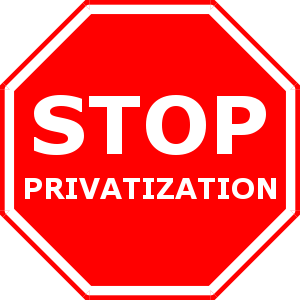 The sale of the airports whets the
appetite of a section
of the ruling imperialist elite both as buyers and sellers. For the
buyers, airports represent a necessary public service where user/rental
fees by airlines, passengers and retail outlets hold tremendous
potential for private profit. For the sellers, the sale price
represents a one-time injection of
cash into the federal coffers to transfer into the pockets of other
oligarchs. The sale of the airports whets the
appetite of a section
of the ruling imperialist elite both as buyers and sellers. For the
buyers, airports represent a necessary public service where user/rental
fees by airlines, passengers and retail outlets hold tremendous
potential for private profit. For the sellers, the sale price
represents a one-time injection of
cash into the federal coffers to transfer into the pockets of other
oligarchs.
The current airport ownership model according to a
spokesperson for Transport Canada is the following: "Airport
authorities, the entities operating the largest airports in Canada, are
private, not-for-profit, non-share capital corporations. They are not
government entities. What is commonly meant when using the term
'privatization' in this
context is, rather, a move from the current not-for-profit corporate
structure, to a for-profit corporate structure." The Transport Canada
definition is disingenuous. If airports are "not government entities"
but private corporations, why then does the federal government have the
right to sell those private corporations and pocket the sale price?
In the world of the neo-liberal elite, selling off
Canada's airports is quite innocent, just a minor change to the
corporate structure. What this seeming innocence masks is that control
is handed over to oligopolies which are out of control. An imperialist
outlook uses the privileges of state to impose the aim for society as
the striving to squeeze
private profit for the oligarchs from every cell of the economy to the
detriment of the people and country. The sellers and buyers in this
case are one and the same interests. The individuals involved
themselves move seamlessly from government to big business to being
point persons of the state and back again to advance private interests,
careers
and corporations. The federal Minister of Finance Bill Morneau is a
prime example. Moving from his company Morneau Shepell into government
opens great prospects to advance his career and the private interests
of his billion dollar company and sector. Governments at all levels
have tremendous influence and offer possibilities for expansion.
From the Morneau Shepell website we get this description of the
business: "Health and Benefits, Administrative Outsourcing, Asset and
Risk Management, Retirement and Pensions."
To describe airports as "private, not-for-profit,
non-share capital corporations" is deceptive. Airports are a necessary
facility in air transportation. Without airports, airlines could not
function. The value airport workers produce is incorporated into the
value airline workers produce creating the entire value of a passenger
ride or available seat on
a plane, not to speak of the movement of freight. This value does not
include the retail sector at the airports, which is not integral to
flying but has its own dynamic.
The privatization of the Canadian airline industry
began in the mid-20th century with the formation of Canadian
Pacific Airlines, a subsidiary of CP Rail, along with Pacific Western
Airlines and Wardair as private carriers. The federal government of
Brian Mulroney privatized Air Canada in 1988, which later merged
with the other
privately held Canadian airlines.
Privatized Air Canada intensified the class struggle
against its employees to force them to reduce their claim on the value
they produce. Using its private corporate character as a weapon, it
entered bankruptcy protection of the Companies' Creditors
Arrangement Act (CCAA) in 2003 demanding radical reductions in
wages and
benefits, and detrimental changes to the workers' pension plans and
working conditions.
 
Air Canada maintenance workers (left) and flight attendants fighting
for their rights in 2011.
The airports use their corporate structure to keep
their employees disorganized and insecure. The airports do not
consider themselves employers of most workers who do the work but
merely coordinating centres contracting out most work to other
companies for limited periods. In this way, airport workers do not even
have the stability
of direct employment with a state agency or corporation directly in
control and responsible for the means of production. Lacking stability
and a central employer in control of the workplace, workers are
subjected to constant downward pressure on their claim on the new value
they produce as different contract companies come and go.
The method of contracting out work at airports also
puts the lie to their character being "not-for-profit," as the
contracted companies are private for-profit companies claiming a
portion of the added-value their workers produce.
The instability and lower wages, benefits and poor
working conditions extend to airport workers in the retail sector as
well. Similarly, airport retail workers are considered workers of
separate retail outlets and not employees of the airport. This status
is used to split them from their fellow airport workers, weaken their
collective strength and
deprive them of their rights.
|

Workers at Pearson International Airport in Toronto unite in action on
May Day 2017.
|
The value airport workers produce is realized in
exchange as rental fees from the airlines and from passenger user fees.
The added-value airport workers produce goes towards various claimants
including the top executives, interest on outstanding debt, the owners
of the contracted companies whose workers do the work, the state, and
possibly
towards lower rental rates for airlines and user fees for passengers,
and for reinvestment back into the airports for renewal and expansion.
The sale of Canada's airports would concentrate their
ownership in the hands of the global financial oligarchy increasing
their wealth, power and control over the lives of Canadians. The
added-value airport workers produce would more commonly go out of the
local economy and into the hands of the global oligarchs who gain
control. It may
also bring pressure to raise the rental fees for airline carriers and
retail outlets and eliminate any claim those companies have had on the
added-value airport workers produce. This is one reason why a section
of the ruling imperialist elite oppose the sale of airports. Also, the
pressure to raise passenger user fees would be constant.
For airport workers who are now actively fighting to
defend their interests and rights in organized actions with analysis
throughout the country, the opponent in the class struggle would change
in the sense they would be doing battle more directly with global
oligarchs and their state weapons such as CCAA.
The
present
corporate
method
of
contracting out bits and pieces of airport work would
probably continue as contracting out is a preferred method for the
oligarchs especially in the service sectors.
The overall picture is a challenge for Canadians to
change the direction of the economy in general away from the control of
the financial oligarchy and its class privilege and overbearing power
to deprive the people of their rights. The economy should serve those
who do the work, those who need the use-value workers produce, and the
general interests of society. For this to happen, working people have
to organize their independent political headquarters and institutions
and deprive the ruling imperialist elite of their power to deprive
Canadians of the right to control those affairs that affect their
lives, very importantly the basic sectors of the economy.
All out to build the new, a modern nation-building
project that vests sovereignty in the people and guarantees their
well-being and rights!

Growing Opposition to Privatization of
Public Assets
Ontario Public Sector Workers Denounce Hydro One's
Empire-Building Purchase of a U.S. Utility

March to Queen's Park on April 8, 2017 demands government stop
privatizing Hydro One.
Hydro One is Ontario's electricity distribution and
transmission
utility. The Ontario government has steadily sold chunks of shares of
the Hydro utility to private interests during the last two years.
Non-state ownership has now reached 60 per cent. Recently,
privatized
Hydro One used the former public assets as collateral to
borrow $3.4 billion to finance the purchase of a U.S. gas and
electricity utility called Avista and in addition assumed the purchased
company's $2.3 billion in U.S.-based debt.
The Ontario section of the Canadian Union of Public
Employees
(CUPE) has strongly denounced both Hydro One's privatization and its
recent purchase as contrary to the public good and interest. CUPE
Ontario is waging a campaign against the privatization of Hydro One as
part of the Keep Hydro Public Coalition and is currently engaged in
a misfeasance suit against the Ontario government over this
privatization.
CUPE says Hydro One's $6 billion in new debt will
put Ontario
electricity consumers at risk of even greater rate increases than they
have already suffered. According to the union, since private interests
took over majority control of Hydro One this past spring, the company
has already applied for and been granted a rate increase. Hydro
One's empire-building includes not only Avista but local public
utilities across Ontario.
A CUPE July 20 press release denouncing Hydro
One's purchase says,
"Hydro One's purchase of U.S. utility puts empire-building ahead of
Ontario rate payers."
Referring to this empire-building, CUPE Ontario
President Fred Hahn
says in the communiqué, "If you needed proof that privatizing
Hydro One
is bad for the people of Ontario, this is it. Under public control the
company's mandate was to deliver reliable and affordable power to
Ontarians. Now it's a private, predatory company
focused on profits and building a private multi-national electricity
empire. And they're taking on billions in debt that the people of
Ontario will have to cover if their gamble doesn't pay-off. This is not
good for Ontario and now it's not good for the people of Oregon,
Washington and Alaska. Our grandparents bought and paid for Ontario's
hydro
system to make sure our province could always count on reliable and
affordable power for our home, our industries and our small businesses.
And now Ontario Energy Mister Glen Thibeault has the audacity to try
and spin this [empire-building] as a positive and intended consequence
of his government's privatization plan – it's
Orwellian."

Health Canada Gives Go-Ahead to Private
Pay-for-Plasma Clinic in New Brunswick

Protest in Halifax, March 24, 2016, demands province not allow sale of
plasma and blood.
Health Canada on July 24, gave the green light to
private company
Canadian Plasma Resources to pay people for their blood plasma at its
clinic in Moncton, New-Brunswick. The company plans to sell to foreign
pharmaceutical manufacturers whatever plasma it buys from Canadians.
The clinic has been open for months but only
allowed legally to collect plasma from a few dozen donors for purposes
of what it calls training, subsequently discarding the plasma or
donating it for research.
Canadian Plasma Resources currently operates a donation
clinic in
Saskatoon. It had two clinics in Ontario, but they were shuttered by
provincial legislation in 2014. Donors at the Saskatoon clinic and
now
at the Moncton clinic will receive a VISA gift card that ranges
from $25 to $50 in payment for their blood.
Health Canada has given the green light to the
pay-for-plasma
clinic in Moncton despite growing opposition from the people of New
Brunswick and across Canada. Activists of the campaign to ban payment
for plasma, working through the Canadian Health Coalition and its
provincial chapters such as the New Brunswick Health Coalition,
recall the situation in the early 1980s and '90s when
over 30,000
Canadians were infected with HIV and hepatitis C through blood
transfusions. A Royal Commission Inquiry chaired by Justice Horace
Krever on the blood scandal recommended the creation of a new blood
agency, the Canadian Blood Services, as well as stricter
regulations.

Justice Krever's report said that Canadian blood supply
should be governed by five basic principles:
- blood is a public resource;
- donors should not be paid;
- sufficient blood should be collected to preclude imports from other
countries;
- access to blood and blood products should be free and universal; and,
- safety of the blood supply system is paramount.
The Krever report also recommended whole blood, plasma
and platelets be collected in quantities that meet domestic needs.
"I don't understand why federal Health Minister, Jane
Philpott, is
allowing Canada to move backwards and jeopardize the safety of our
blood system," wrote Adrienne Silnicki, National Coordinator of the
Canadian Health Coalition last April regarding the Canadian Plasma
Resources' Saskatchewan clinic. "Despite evidence from other
countries which show a donor-remunerated plasma system will directly
compete with our voluntary system, the federal government has still
given CPR the green light," she said.
The federal government insists it must create
competition to the
public voluntary plasma clinics with private pay-for-plasma clinics
because of the gap between domestic need and Canadian supply. Instead
of taking steps to ensure a domestic supply of plasma is provided
through public clinics the government is using the current lack to
allow
the privatization of yet another aspect of health care.
Instead of increasing domestic voluntary supply,
Canadian Blood
Services has closed down some of its voluntary plasma collection
centres. This opens the door for propaganda that private health care is
necessary to compete with a universal free public system accessible to
all Canadians.
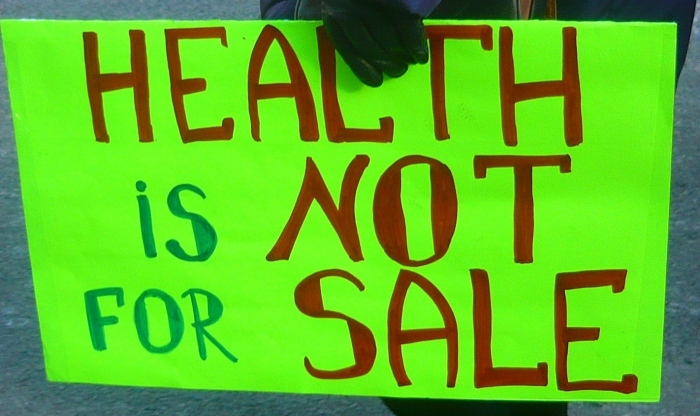
The manipulation of the situation is exposed by the fact
that
Canadian Plasma Resources will export Canadian plasma for sale on the
international market most likely to the United States, where it will be
mixed with large pools of plasma from other paid donors. A similar
situation is developing in the international private trade for profit
in
human organs.
In the end there will be no greater self-sufficiency in
plasma
products. Canada will still have to import plasma-based drugs unless
Canadian Blood Services expands its voluntary plasma collection sites
to increase supply of plasma. By licensing Canadian Plasma Resources to
collect plasma from paid donors, Health Canada and the
Saskatchewan and New Brunswick governments are promoting the global
private for-profit trade in plasma, not creating self-sufficiency for
Canada. This increases the domination and control of Canada's health
system by the global pharmaceutical and other medical oligopolies.
The Health Coalition says this international trading of
plasma on
the global markets in the context of NAFTA and big business dominated
free trade agreements intensifies the pressure against the sovereign
right of nations to build their own health care systems including an
internal public supply system of plasma and other necessary products
for a successful free universal public health care system that
guarantees the people's right to health care.
Resistance to Health Canada's green light for the
private pay-for-plasma clinic in Moncton will not fade. Workers'
Forum
recently talked with Daniel Légère, the President of CUPE
New
Brunswick, which is part of the Health Coalition, who said, "This
coalition is there to stay. For months, we have waged that campaign, we
have
done demonstrations, we have hired somebody to manage the office on a
regular basis, we've had a campaign on the social media, etc. The
resistance is going to carry on and is likely to increase as New
Brunswick is going into a general election in September 2018 and
this
is going to be made an election issue, I am sure."

Note to Readers
With this issue, Workers'
Forum will take a break and resume publication on Labour Day,
September 4, 2017.
During this time, please continue to support this important work to
smash the silence on
workers' living and working conditions across the country, by sending
your views, reports and
photos, as well as sharing Workers' Forum with your friends and
coworkers and all
those fighting for the dignity of labour and defending the rights of
all.
We also urge you to financially support the Workers' Centre of CPC(M-L)
to make its work
possible, including the publication of Workers' Forum. Your
all-sided support is
greatly appreciated.
We wish you all the best for summer.
Workers' Forum Editorial and Technical Staff
* To donate by mail, send cheque or
money order payable to: MLPC. Send to: P.O. Box 666, Postal Station C,
Montreal, Quebec, H2L 4L5. Please include full name and address for
contributions over $20, as the
MLPC will issue a tax
receipt. The maximum contribution to a registered political party
permitted by law in 2017 is
$1,550.00.

PREVIOUS
ISSUES | HOME
Website: www.cpcml.ca
Email: office@cpcml.ca
|



 A Ministry press release on
July 4 states the
Trade and Transportation Corridors Initiative is "[to] build stronger,
more efficient transportation corridors to international markets....
Canadian businesses will be able to better compete, grow and create
even more jobs well into the future."
A Ministry press release on
July 4 states the
Trade and Transportation Corridors Initiative is "[to] build stronger,
more efficient transportation corridors to international markets....
Canadian businesses will be able to better compete, grow and create
even more jobs well into the future." The implication is not borne
out with facts. The
announcement was made at about the same time Employment and Social
Development Canada revealed an increasing number of EI claimants are
receiving five additional weeks of benefits in 15 regions of the
country where unemployment has exploded over the last two years. The
program to extend EI eligibility, while still far below the actual
needs, temporarily untied the EI purse strings propelled by a rise in
unemployment in several regions. The expected number of 235,000
unemployed receiving the five weeks of additional EI benefits turned
out to be 317,261 unemployed workers.
The implication is not borne
out with facts. The
announcement was made at about the same time Employment and Social
Development Canada revealed an increasing number of EI claimants are
receiving five additional weeks of benefits in 15 regions of the
country where unemployment has exploded over the last two years. The
program to extend EI eligibility, while still far below the actual
needs, temporarily untied the EI purse strings propelled by a rise in
unemployment in several regions. The expected number of 235,000
unemployed receiving the five weeks of additional EI benefits turned
out to be 317,261 unemployed workers. Minister Garneau does not
consider it a problem that
Canada, as a dominated trading nation:
Minister Garneau does not
consider it a problem that
Canada, as a dominated trading nation: Across the country, workers
are opposing the denial of reality and pragmatic ambitions of the
Canadian government to serve the strivings of the global oligopolies at
all costs to the detriment of the well-being and security of Canadians
and their economy. The need is becoming more and more obvious for the
working class to assume its social responsibility to change the
direction of the economy to make it work without crises for the benefit
of all. In this regard, advanced workers are building the independent
press of the working class such as
Across the country, workers
are opposing the denial of reality and pragmatic ambitions of the
Canadian government to serve the strivings of the global oligopolies at
all costs to the detriment of the well-being and security of Canadians
and their economy. The need is becoming more and more obvious for the
working class to assume its social responsibility to change the
direction of the economy to make it work without crises for the benefit
of all. In this regard, advanced workers are building the independent
press of the working class such as 
 The sale of the airports whets the
appetite of a section
of the ruling imperialist elite both as buyers and sellers. For the
buyers, airports represent a necessary public service where user/rental
fees by airlines, passengers and retail outlets hold tremendous
potential for private profit. For the sellers, the sale price
represents a one-time injection of
cash into the federal coffers to transfer into the pockets of other
oligarchs.
The sale of the airports whets the
appetite of a section
of the ruling imperialist elite both as buyers and sellers. For the
buyers, airports represent a necessary public service where user/rental
fees by airlines, passengers and retail outlets hold tremendous
potential for private profit. For the sellers, the sale price
represents a one-time injection of
cash into the federal coffers to transfer into the pockets of other
oligarchs.



